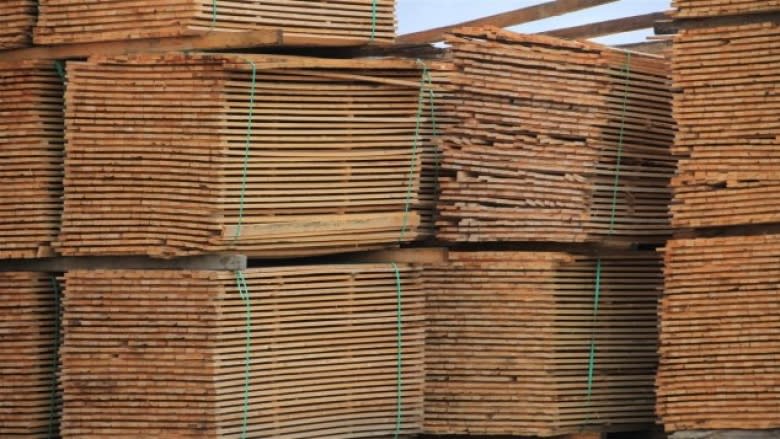J.D. Irving Ltd. had advantage in fighting for lower tariff, says Roger Melanson
New Brunswick's minister in charge of trade says J.D. Irving Ltd. had advantages over other sawmill companies in the province that may have helped it win a lower tariff on its softwood sales to the U.S.
For the second day, Roger Melanson insisted that the three per cent tariff imposed by the Trump administration on Irving is a sign that sawmill operators in the province are not unfairly subsidized.
But Melanson also acknowledged that Irving had the resources to make its case in Washington — resources that smaller companies lack.
"Obviously, when you want to become investigated on a voluntary basis, it's a significant investment," Melanson said, noting JDI submitted more than 9,000 pages of documents to the U.S. government.
"It's a big task and some of our smaller players in the industry may not have the same capacity."
Other softwood companies in New Brunswick and across Canada have been hit with a tariff of almost 20 per cent, a rate that industry representatives say could put some of them out of business.
The tariff will be finalized later this year, but it will be collected at the border in the meantime.
'Important player'
J.D. Irving, with sawmills in Baker Brook, Saint-Léonard, Kedgwick, Doaktown, Chipman and Sussex along with other operations, is the largest player in New Brunswick's forest industry.
Melanson called the company "one of the most important players, of course, but they're all very important in New Brunswick's industry."
Irving is the only company in Canada to have received such a low tariff.
Melanson said the three per cent rate applied to Irving shows that New Brunswick forest companies in general should not be subject to a higher tariff.
"I think it's a very good sign," he said. "We clearly read out of this that the industry in New Brunswick is not being subsidized, and this is the rate that needs to be applied, at a maximum, to all industry."
J.D. Irving made the same argument on Tuesday.
But Melanson also acknowledged Irving is unique.
"It's obvious JDI has some elements that are different," he said when a reporter asked if Irving's operations in Maine might have spared it from a harsher tariff.
Works in conjunction
Jerome Pelletier, JDI's vice-president of sawmill operations, said Wednesday he doesn't believe the U.S. Commerce Department's process was influenced by the company's employment of hundreds of Americans.
"It's fact-based and I don't believe that having operations in the state of Maine changed their conclusion," Pelletier told CBC's Information Morning Saint John.
In a separate trade case involving Irving paper exports to the U.S., Maine Gov. Paul LePage and three U.S. senators lobbied the Obama administration in 2015 to not impose duties on the company's products, citing possible job impacts in their states.
The company uses a top Washington law firm, White and Case, that specializes in international trade.
Pelletier said the company maintains an "open channel of communication with different stakeholders in the United States … to ensure we're represented properly" in Washington. He said the company does this in conjunction with other New Brunswick forestry companies.



